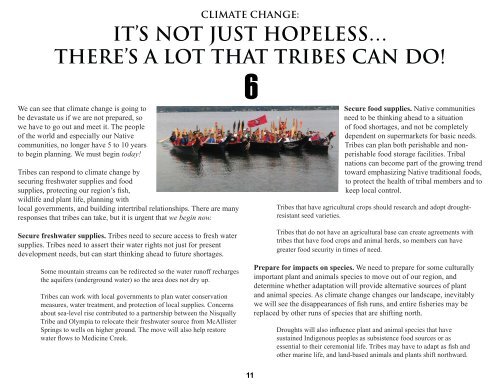Northwest Tribes: Meeting the Challenge of Climate ... - OSU Press
Northwest Tribes: Meeting the Challenge of Climate ... - OSU Press
Northwest Tribes: Meeting the Challenge of Climate ... - OSU Press
You also want an ePaper? Increase the reach of your titles
YUMPU automatically turns print PDFs into web optimized ePapers that Google loves.
CLIMATE CHANGE:<br />
IT’S NOT JUST HOPELESS…<br />
THERE’S A LOT THAT TRIBES CAN DO!<br />
We can see that climate change is going to<br />
be devastate us if we are not prepared, so<br />
we have to go out and meet it. The people<br />
<strong>of</strong> <strong>the</strong> world and especially our Native<br />
communities, no longer have 5 to 10 years<br />
to begin planning. We must begin today!<br />
<strong>Tribes</strong> can respond to climate change by<br />
securing freshwater supplies and food<br />
supplies, protecting our region’s fi sh,<br />
wildlife and plant life, planning with<br />
local governments, and building intertribal relationships. There are many<br />
responses that tribes can take, but it is urgent that we begin now.<br />
Secure freshwater supplies. <strong>Tribes</strong> need to secure access to fresh water<br />
supplies. <strong>Tribes</strong> need to assert <strong>the</strong>ir water rights not just for present<br />
development needs, but can start thinking ahead to future shortages.<br />
Some mountain streams can be redirected so <strong>the</strong> water run<strong>of</strong>f recharges<br />
<strong>the</strong> aquifers (underground water) so <strong>the</strong> area does not dry up.<br />
<strong>Tribes</strong> can work with local governments to plan water conservation<br />
measures, water treatment, and protection <strong>of</strong> local supplies. Concerns<br />
about sea-level rise contributed to a partnership between <strong>the</strong> Nisqually<br />
Tribe and Olympia to relocate <strong>the</strong>ir freshwater source from McAllister<br />
Springs to wells on higher ground. The move will also help restore<br />
water fl ows to Medicine Creek.<br />
6<br />
11<br />
Secure food supplies. Native communities<br />
need to be thinking ahead to a situation<br />
<strong>of</strong> food shortages, and not be completely<br />
dependent on supermarkets for basic needs.<br />
<strong>Tribes</strong> can plan both perishable and nonperishable<br />
food storage facilities. Tribal<br />
nations can become part <strong>of</strong> <strong>the</strong> growing trend<br />
toward emphasizing Native traditional foods,<br />
to protect <strong>the</strong> health <strong>of</strong> tribal members and to<br />
keep local control.<br />
<strong>Tribes</strong> that have agricultural crops should research and adopt drought-<br />
resistant seed varieties.<br />
<strong>Tribes</strong> that do not have an agricultural base can create agreements with<br />
tribes that have food crops and animal herds, so members can have<br />
greater food security in times <strong>of</strong> need.<br />
Prepare for impacts on species. We need to prepare for some culturally<br />
important plant and animals species to move out <strong>of</strong> our region, and<br />
determine whe<strong>the</strong>r adaptation will provide alternative sources <strong>of</strong> plant<br />
and animal species. As climate change changes our landscape, inevitably<br />
we will see <strong>the</strong> disappearances <strong>of</strong> fi sh runs, and entire fi sheries may be<br />
replaced by o<strong>the</strong>r runs <strong>of</strong> species that are shifting north.<br />
Droughts will also infl uence plant and animal species that have<br />
sustained Indigenous peoples as subsistence food sources or as<br />
essential to <strong>the</strong>ir ceremonial life. <strong>Tribes</strong> may have to adapt as fi sh and<br />
o<strong>the</strong>r marine life, and land-based animals and plants shift northward.



